Palmyra is a top tourist site in Syria. However, going there I did not expect meeting crowds. The tense situation in the country, the low season and the religious holiday were a guarantee of minimal number of visitors.
Indeed, there were almost no tourists. Also, the city of Tadmur, which neighbours the ruins of Palmyra, looked like half abandoned. Closed restaurants, souvenir shops, no Internet and nearest falafel a 15 minutes walk from the hotel. The shortage of diesel fuel, which had been a countrywide problem for weeks, manifested itself in lack of hot water. However, being quite tired after the last long ride, and having another 250km of desert to cross, I stayed there for two days.
The ruins of Palmyra are big. That's all. Not being a fan of classical Greco-Roman architecture, I did not find them to be very impressive. Even more disappointment came after I had spent 10USD for the entry ticket at the Temple of Ba'al, which is actually a pile of rocks with only few of them sculptured in interesting way. The ticket allowed me to visit all other paid attractions in the neighbourhood, but soon I discovered them not keeping to the announced timetable and closed very early.
The city itself was another challenge. Even in Syria, where people are generally friendly and foreigners have little chance of being ripped off, in the tourist sites the general rules apply. Children ask for money, and some of them are quite skilled in playing role of a poor and hungry one. Shopping is also fun. The first calculation by a shopkeeper is often based on a simple formula: you buy five items, you pay 5USD. Even if there are prices written on the products. Reprimanding does not bring even a shade of shame to their faces, but lowers the price. After going down to the right number eventually, you may even hear „sorry” and be given a free candy, but the same process repeats on the next day. Ripoff is just the way of living in such places and it had not been unknown to me, but after such good impressions of Syria I found it to be more disgusting than usually.
After over two weeks spent in the country, I finally met some foreigners. One of them was not completely foreign for me, as he could speak Polish, despite being born in the US. Another one, a young Norwegian, was on the way from his homeland to... South Africa! Although we had almost the same routes, he was using two wheels more and different timescale. He had begun the journey in September and planned to finish it in next few months. However, we could exchange some experiences from the countries passed and share ideas about the ones ahead.
And there was a British couple, who live and work in the Middle East. I gave them my unused tickets and got a contact in Cairo, which may become very useful for my planned stay there.
Finally, I departed for the long haul ride to Damascus. Over 240km through the desert awaited me. The first idea was to split it into two equal daily distances, but waiting fruitlessly for the ruins of antic theatre to be opened, I lost precious morning time. That was my weak day. Blazing sun made my head ache, despite being protected with a headscarf and dark sunglasses. Cycling well after the sunset, I finished without reaching 100km. The next day was much easier, with some clouds and more downhill.
The road to Damascus has obviously much more traffic than the one I used when coming from Homs. Part of it also serves as a link to Iraq, so the amount of trucks and buses is just too much for the narrow, shoulderless single lane. Surprisingly, the drivers with cargo seem to be less aggressive and more thoughtful than those responsible for several dozens of human lives on board. Buses seem to have their gas pedals bolted to the floor when starting. They never slow down, overtaking every vehicle which happens to be going a bit slower, even if it's in the process of overtaking another one itself. Their drivers usually announce themselves before sliding past a cyclist with few centimeters distance and 100km/h speed difference. Usually, because quite often the hand used for pressing horn is already occupied by a mobile phone. I'm beginning to understand why so many vehicles here are adorned with a sign saying "mashallah", which roughly translates to "It's God's will".
Surprisingly, I arrived to the capital in one piece. Quickly I found a nice hostel, arranged in an old residence with pleasant courtyard, next to a small bazaar and café street. With that comfort, beauty, easy access to food and a low price, the place is just great. It would be even better if there were any other travellers. On one evening I met two Chinese women, but otherwise the only people in the courtyard café are groups of locals, who come to drink tea, smoke narghile, use wireless Internet and go away, while the hostel could host dozens of people. Even though I heard of the attacks on several embassies in Damascus, there was no sight of threat on the streets. Yet, foreigners had been successfully scared out of coming to Syria, bringing all the tourist business to it's knees.
The city itself is pleasant, with nice old quarter, famous bazaar and great mosque in the center. However, my reaction was not as enthusiastic as it had been in Aleppo. Perhaps I became used to Syria. This and a look into calendar tell me it's the time to move on. As there is not much to see in the south, and the situation in cities there is still questionable, I will probably dash to the border, which would take about two days.

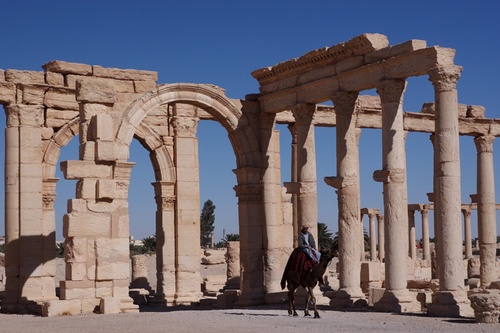
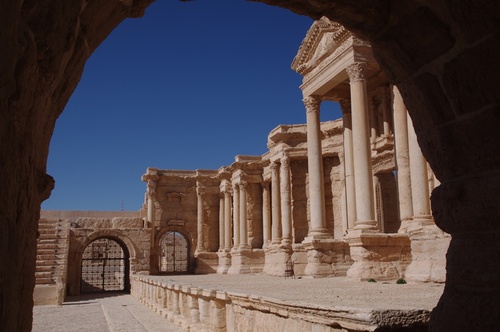
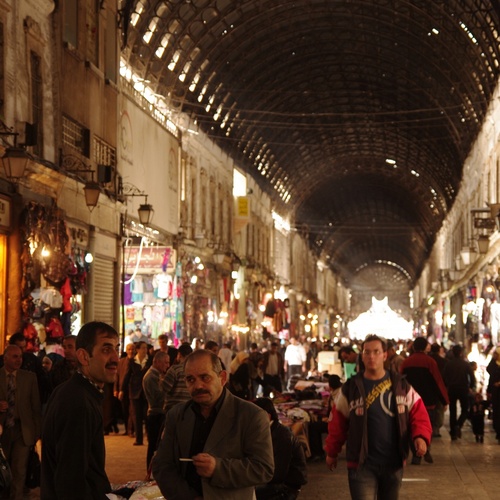
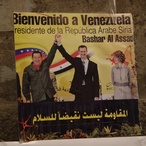
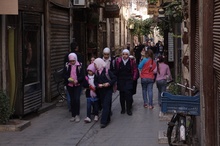

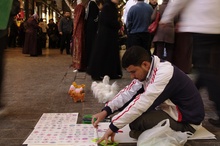

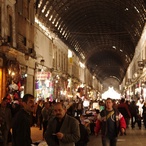
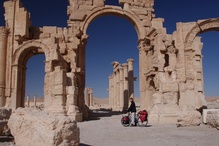
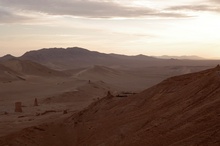
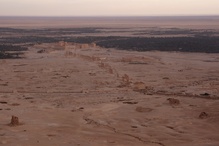
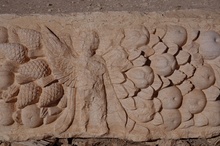
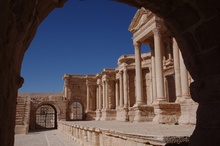
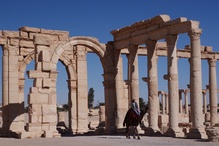
Comments:
mama
Wojtek
Pozdrower
W.
Marta
pozdrawiamy
Chris
Do you feel isolated from the fact that the whole country is about to explode in a civil war?
michal
As it comes to the civil war, nothing is exploding. Rather warming up very slowly.